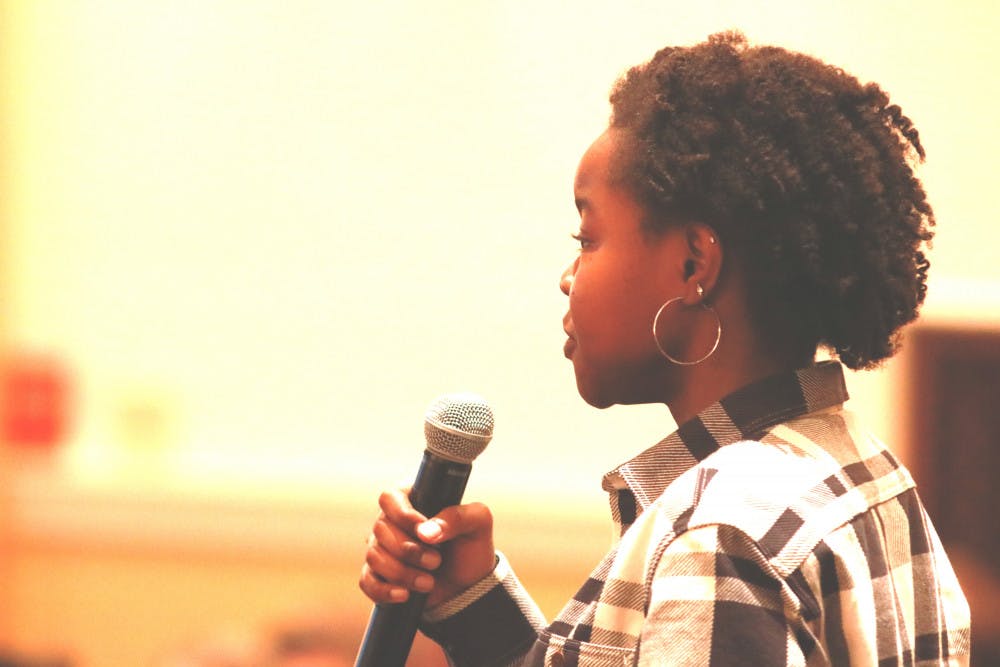By Elizabeth Zakaim, Camille Furst and Nicole Viviano
Editor-In-Chief and New Editors
In light of the recent racial incidents that have occurred on campus, the administration has addressed feedback and questions from the community regarding what actions will be taken to better manage any future instances of racism and discrimination.
On Feb. 1, Interim Vice President of Student Affairs Sean Stallings announced the resolution of the student conduct investigation concerning the students involved in the racial bias incident that occurred in and outside Wolfe Hall on Nov. 16.
According to Stallings, the investigation, which ended Jan. 31, found four students responsible for violating the Student Conduct Code's prohibition of bullying, intimidation and harassment. The students have been suspended until the fall semester of 2020, after the student reporters involved are expected to graduate. They must also complete educational sanctions before returning to the College.
Three of the four students have been banned permanently from campus housing.
Stallings also made clear that this case poses as an extenuating circumstance and that the campus community should not expect to receive updates on other conduct cases due to the expectations of reasonable privacy and due process.
"I want all members of our community to know that discrimination and bias intimidation have no place at TCNJ," Stallings wrote. "Reports of such conduct will be investigated thoroughly and, when substantiated, appropriate sanctions will be imposed upon the individuals found responsible for the prohibited conduct."
President Kathryn Foster announced in an email sent out on Jan. 2 that Ivonne Cruz, the current director of the Educational Opportunity Fund and the Center of Student Success, will now serve as the Acting Vice President for Institutional Diversity, Equity and Inclusion.
Cruz’s office is located in Green Hall, while Chief Diversity Officer Kerri Thompson Tillett and Director of Student Diversity and Inclusion Don Trahan can be found in the Student Center.
According to Foster’s email, her new role will involve working with Trahan and Tillet to create a Bias Response Team. This team will better organize how the College responds to future incidents of discrimination. According to Stalling's Feb. 1 email, more information about this online reporting outlet will be announced in the next two weeks.
“We didn’t have a formal structure and system prior to that situation,” Trahan said regarding the school’s responsiveness to previous issues of discrimination. “While we were able to be extremely responsive, the objective as we move forward is not have to be responsive but (to be) proactive (and) have the procedure in place.”

While the team is still in the process of completion, Trahan said that it is one of the many goals the College is aiming to complete as part of its six-month plan to better arm itself against future incidents.
“There’s not a day that goes by where I do not get something that comes across my desk or in an email … that pertains to the concern of diversity equity and inclusion,” Trahan said. “That sense of inclusivity becomes what’s the most problematic.”
Students have had varied reactions to both the recent racial incidents and the ‘I Am TCNJ’ Forum, which sought to open dialogue about the current campus climate. While some reacted to the forum positively, others felt it would not do much to cause any real change.
“Promises have been made to make a difference which is a good thing,” said Ashley Ean, a sophomore accounting major. “But to be honest, I would have liked something more tangible than simply promises.”
Others applauded President Kathryn Foster for her timeliness in addressing the racial incidents and plans for the future.
“When President Foster brought out her plan of action at the forum, that actually took me aback for a couple minutes,” said sophomore elementary education and English major Evan Berrios. “Having to face something like this is completely difficult.”
Stallings addressed the campus in an email sent out on Dec. 5 that included information about the administration’s responses to questions asked at the ‘I AM TCNJ Forum.’
“The high level of engagement and authenticity displayed by members of our community is a testament to how important it is that we come together to work towards building and sustaining a campus climate that is inclusive and celebrates the richness of diversity,” Stallings wrote.
According to the written forum follow-up, posted by the Office of Institutional Diversity, Equity and Inclusion, both the Student Conduct Code and the faculty and staff handbooks will be in review to ensure that they speak to the expectations of everyone at the College. Students will also have a chance to be more involved in this process.
Many students were also dissatisfied with the way student staff of Residential Education handled the racial incident at Wolfe Hall, and wanted to know why the police were not called at the time.
According to the follow-up, the student staff member who was called to the incident was not on duty at the time and did not have a crisis manual to consult as a resource.
However, according to the follow-up, all staff members are trained on how to handle harassment scenarios, and part of that protocol involves calling the professional staff member on duty and the police.
Student staff members were since provided with an electronic copy of the crisis manual and were given more in-depth training sessions over winter break that addressed how better respond to these incidents and create more inclusive communities. According to the follow-up, staff members will also be held more accountable for the learning outcomes required of them during training.
In an email sent out on Dec. 17, Foster discussed how the OIDEI is also planning on implementing more skills training for everyone on campus and monitoring issues of equity, which will be done through a universal inclusion survey.
“Responses have led also to an additional campus climate survey for the LGBTQ+ community and a special focus group for black students on campus,” Foster wrote. “More generally, the OIDEI is crafting a list of ‘what success looks like in six months.’”
While the College already trains Campus Police on anti-discrimination practices on a regular basis, the six-month plan will also include monthly educational sessions to keep diversity and inclusion an active initiative among faculty as well, according to the follow-up.
Some students are still skeptical about how effective training programs will be for campus employees.
“Training the employees is well and good, but I don’t believe one can train racism out of people,” said Kieran Nashad, a freshman open options arts and communications major. “It’s not TCNJ’s fault, but they have to find a way to communicate anti-racism to the students.”
Students wanted to change how freshmen are educated on racial bias, as a way to nip future incidents in the bud.
According to the follow-up, the Liberal Learning Task Force, which came into formation again last semester, is currently reviewing the Freshman Seminar Program course topics after students requested that a liberal learning requirement regarding the topic of diversity be more widespread amongst freshmen classes. Currently, only some of these courses address topics of diversity and inclusion.
Other students are pleased with the training initiatives among all levels of campus life.
“I can already see where changes are being made,” said Viane Villanueva, a sophomore nursing major. “I recently completed training, for my on-campus job, which covered harassment prevention.”
Prevention and proactivity are two of many serious measures that the College is taking to ensure a more inclusive community.
“People have the capacity to learn and the capacity to change,” Ashley Ean, a sophomore accounting major. “We can prevent as many incidents like the one that caused the TCNJ forum to occur and punish those who continue racist behavior.”
While some students felt the perpetrators from the racial incident that jump-started the College’s diversity and inclusion initiative were properly dealt with, others expressed that disclosing the situation, participants and outcome of future situations should be brought to students’ attention via a campus-wide acknowledgement.
“After the incident, I expected more information on what specifically occurred and what was done to the students that committed these hate crimes,” said Viane Villanueva, a sophomore nursing major. “I would like for there to be more transparency regarding matters like this.”
According to Luke Sacks, the head media relations officer at the College, the case involving the students responsible for the incident is still in progress and no formal comment can be made on its status.
The follow-up also addresses students’ demands that all slurs to be treated as hate crimes.
“Although slurs are clear instances of bias intimidation, they may not be hate crimes under the law,” the follow-up reads. “TCNJ will continue to follow applicable law regarding hate crimes and bias intimidation, and will follow up accordingly. Review of the conduct codes may make explicit the scope of hate crimes versus other acts that fall under New Jersey law in a category of ‘bias intimidation.’ Consequences would vary depending on the act itself.”
Students also want to see more transparency from the administration throughout every step of the various processes. Although there are restrictions on what information can be disclosed, according to the follow-up, the OIDEI can compile data to indicate the numbers and nature of bias incidents, and how they may have been resolved –– all while protecting privacy.
The College’s addressal of diversity and inclusion has begun to grow strong roots in the institution. Administrators such as Trahan hope to see the College’s efforts make an impact on its population and that students take advantage of the current developments he has implemented in his year here, such as the Critical Conversations and other open dialogue events.
“Do we have areas for growth? Absolutely,” Trahan said. “But that’s the nature of change management –– its a process.”
With time, training and understanding, Trahan believes that the campus has potential to reform its identity as long as the process remains a collaborative effort of the school’s students, employees, faculty and administration.
“I think the one thing I’ll emphasize is that we are moving forward, and I’m very confident in our ability to do that,” Trahan said. “I’m very confident in what we will see as years go but it’s a process that will require all of us to collectively work together.”
More information about specific responses to campus concerns regarding racial tensions can be found on the College’s website.







